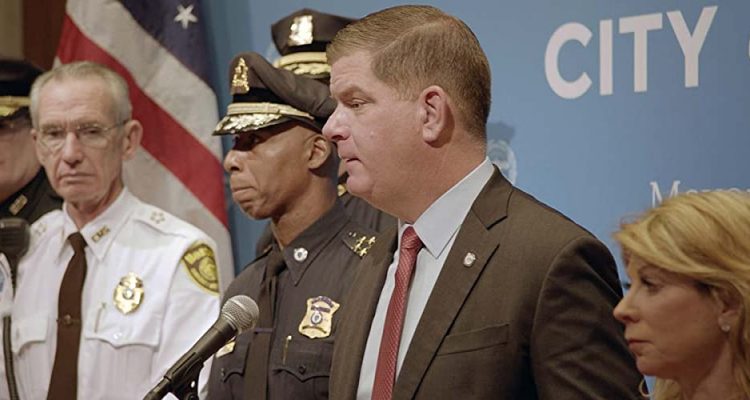“The people who work for the city work for you,” explains Boston Mayor Marty Walsh, to a room full of his constituents. “They’re there to service you.” That simplest of ideas, a real gimme in the not-too-distant past, stands at the center of “City Hall,” the latest of Frederick Wiseman’s documentary deep dives into the nuts and bolts of America’s institutions. He opens with a meeting between the mayor and members of the Boston Police Department, a simple strategy session: what they’re getting right, what they have to improve, what new and transformative ideas they can incorporate into their work (“What’s the follow-up on trauma?”).
READ MORE: Toronto International Film Festival 2020 Preview: 15 Films To Watch
In that scene, and over the four hours and thirty-five minutes that follow, Wiseman – as is his style – observes. He sits in on meetings: budget meetings, school board meetings, housing meetings, community meetings. He visits senior outreach sessions, celebratory ceremonies, and accessibility hearings. He documents City Hall weddings, building inspections, police powwows, veterans’ observances, and career-building workshops. He captures fire calls and animal control visits and trash collection.
READ MORE: 2020 Fall Film Preview: 40 Most Anticipated Films To Watch
As ever, he exhibits an uncanny ability to make the dullest imaginable events compelling – a power that’s not only remarkable, but inexplicable. His films aren’t flashy; he doesn’t dazzle us with his edits, or his snazzy camerawork, or winking on-screen text. He just watches and listens, and he does so with such earnestness, such palpable and genuine curiosity, that we find ourselves doing the same. These meetings aren’t hyper-dramatic barnburners, and it’s rare to even hear a raised voice. (During the end credits, we overhear a 311 operator plead, “Sir, please don’t yell,” and it feels like a mission statement.)
And, as mentioned, the film is quite leisurely. Could it be shorter? Sure. But that’s meaningless; I watched an 83-minute movie last week that could’ve been shorter. But “City Hall” shouldn’t be – the vastness of the movie matches the vastness of its subject. In some of these meetings, a recurring theme emerges: the importance of “telling a story,” and what story the City of Boston and its various departments want to tell. But “telling a story,” whether in public relations or documentary filmmaking, is telling a selective one, in which the teller prunes away the material that does not directly further the chosen narrative.
However, the sheer enormity of the film – the permission Wiseman (who is not only the director but also the producer, editor, and distributor) grants himself to take all the time he wants – means he doesn’t have to tell a story with those kinds of narrow parameters. He’s telling a different one, of the myriad responsibilities and concerns tied to this building, and the idea of it, and thus “City Hall” works in the way that the third (and best, fight me) season of “The Wire” did: as a reminder that city government is almost unfathomably vast and complicated, a series of giant spiderwebs that can tangle easily.
So the picture is inspiring, but casually so; there are no big speeches, no swelling music or sled-hammered themes, and when it feels like it could tiptoe into that territory, he’ll cut to someone paying a parking ticket (literally). If there’s a hero here, it’s Walsh, but this is not conventional portraiture, and as per usual, there are no traditional talking-head interviews, voice-over narration, or archival materials. So the bits and pieces that we get of Walsh’s biography come only through his public speeches and offhand comments: his immigrant parents, his childhood illness, his recovery from alcoholism. We get a sense of how his journey made not only the person, but the politician that he is, and by the end, when he announces, “I love my job,” you believe him.
We can’t shine every new release through the prism of the pandemic, but it’s worth noting that “City Hall” hits considerably different than it might have, and not just because of the unexpected poignancy of all these large-group gatherings. Throughout the film, Walsh comes off as something of an anti-Trump, though Trump himself is only occasionally mentioned, and almost always halfway so (in vagueries like “What happens in Washington, we feel on the streets of Boston”). But what Wiseman’s film boils down to, in many ways, is a much-needed dose of competency porn – a snapshot of government officials trying their very best to do better, and to be better. And that might be the story he’s really telling: a reminder that government, for all of its speed bumps and snags, can work. It can help. The people running it just have to want it to. [A]
Follow along here for all our coverage of the 2020 Toronto International Film Festival.

